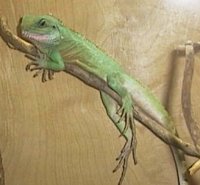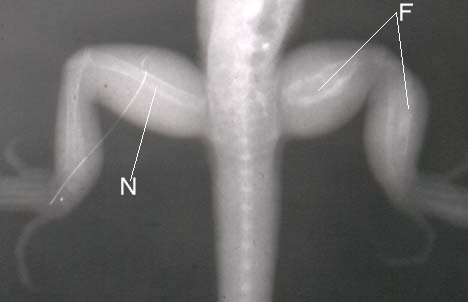 Back
Back
COMMON
PITFALLS IN THE FEEDING OF REPTILES
First broadcast on www.provet.co.uk |
This information is provided by Provet for educational purposes only.
You should seek the advice of your veterinarian if your pet is ill as only he or she can correctly advise on the diagnosis and recommend the treatment that is most appropriate for your pet.
Reptiles are commonly kept as pets these days, but there is a lot of ignorance about how to look after them properly and veterinarians are often presented with reptiles that are ill because they are not being fed properly

A waterdragon
As a general rule reptiles do not make good pets. They often have very specific nutritional and environmental requirements, and they need a conscientious owner who will look after them properly. Anybody who takes it upon themselves to keep a reptile must make sure that they understand how to feed it properly. Reptiles can be carnivores (eats other living creatures eg mice, ants, toads), herbivores (eats plant material) or omnivores (eats foods of animal and plant origin)
The most common disorders associated with feeding are :
- Nutritional deficiency
- calories - poor growth rate, weight loss,
- minerals - calcium deficiency occurs in reptiles fed an exclusively meat or offal diet (which is low in calcium) and it causes multiple bone fractures. The skeletal part of prey is an important source of dietary calcium. Also, Vitamin D is necessary for normal calcium metabolism, and so adequate vitamin D should be in the ration. In addition, exposure to sunlight (or artificial ultraviolet light) helps the reptile to manufacture vitamin D in it's skin.
XRay of a lizard showing thin skeleton and old healing fractures (F) in one leg. Compare with normal bone (N) in opposite leg
- protein
- vitamins (Vit A ; Vit D). Vitamin A deficiency is seen most often in turtles and lizards fed unsupplemented meats and lettuce.Vitamin D deficiency can occur in any reptile fed a poor diet and kept out of natural sunlight or UV light.
- fibre - is needed by tortoises and iguanas. 18% crude fibre recommended by some authors.
- Nutritional excess
- calories - leads to obesity
- minerals (calcium) Oversupplementation
- vitamins (Vit A ; Vit D) Oversupplementation is the most common cause in turtles and tortoises
Updated October 2013
